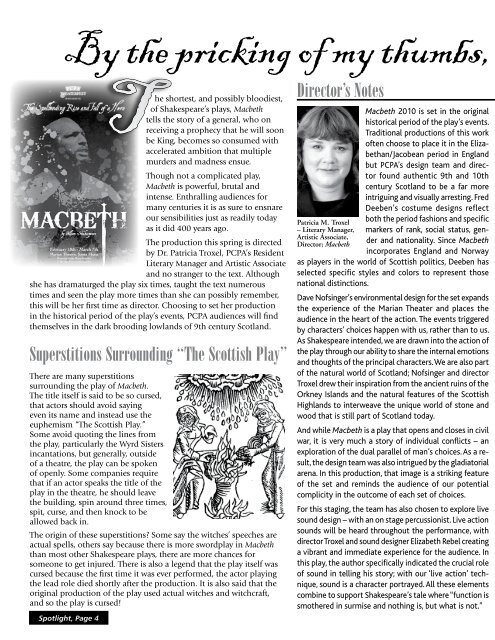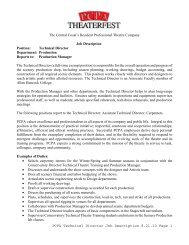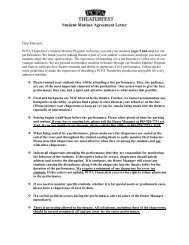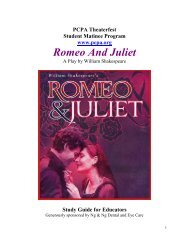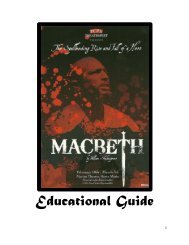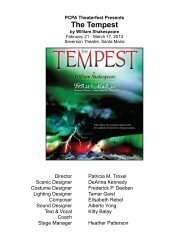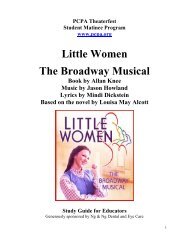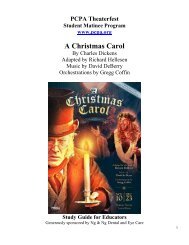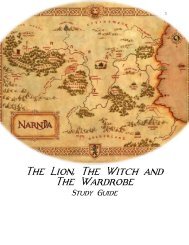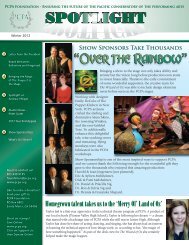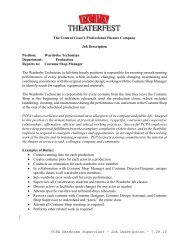Don't miss out on this and other great packages ... - PCPA Theaterfest
Don't miss out on this and other great packages ... - PCPA Theaterfest
Don't miss out on this and other great packages ... - PCPA Theaterfest
Create successful ePaper yourself
Turn your PDF publications into a flip-book with our unique Google optimized e-Paper software.
By the pricking of my thumbs,<br />
Superstiti<strong>on</strong>s Surrounding “The Scottish Play”<br />
There are many superstiti<strong>on</strong>s<br />
surrounding the play of Macbeth.<br />
The title itself is said to be so cursed,<br />
that actors should avoid saying<br />
even its name <strong>and</strong> instead use the<br />
euphemism “The Scottish Play.”<br />
Some avoid quoting the lines from<br />
the play, particularly the Wyrd Sisters<br />
incantati<strong>on</strong>s, but generally, <str<strong>on</strong>g>out</str<strong>on</strong>g>side<br />
of a theatre, the play can be spoken<br />
of openly. Some companies require<br />
that if an actor speaks the title of the<br />
play in the theatre, he should leave<br />
the building, spin around three times,<br />
spit, curse, <strong>and</strong> then knock to be<br />
allowed back in.<br />
The origin of these superstiti<strong>on</strong>s? Some say the witches’ speeches are<br />
actual spells, <strong>other</strong>s say because there is more swordplay in Macbeth<br />
than most <strong>other</strong> Shakespeare plays, there are more chances for<br />
some<strong>on</strong>e to get injured. There is also a legend that the play itself was<br />
cursed because the first time it was ever performed, the actor playing<br />
the lead role died shortly after the producti<strong>on</strong>. It is also said that the<br />
original producti<strong>on</strong> of the play used actual witches <strong>and</strong> witchcraft,<br />
<strong>and</strong> so the play is cursed!<br />
Spotlight, Page 4<br />
T<br />
he shortest, <strong>and</strong> possibly bloodiest,<br />
of Shakespeare’s plays, Macbeth<br />
tells the story of a general, who <strong>on</strong><br />
receiving a prophecy that he will so<strong>on</strong><br />
be King, becomes so c<strong>on</strong>sumed with<br />
accelerated ambiti<strong>on</strong> that multiple<br />
murders <strong>and</strong> madness ensue.<br />
Though not a complicated play,<br />
Macbeth is powerful, brutal <strong>and</strong><br />
intense. Enthralling audiences for<br />
many centuries it is as sure to ensnare<br />
our sensibilities just as readily today<br />
as it did 400 years ago.<br />
The producti<strong>on</strong> <strong>this</strong> spring is directed<br />
by Dr. Patricia Troxel, <strong>PCPA</strong>’s Resident<br />
Literary Manager <strong>and</strong> Artistic Associate<br />
<strong>and</strong> no stranger to the text. Although<br />
she has dramaturged the play six times, taught the text numerous<br />
times <strong>and</strong> seen the play more times than she can possibly remember,<br />
<strong>this</strong> will be her first time as director. Choosing to set her producti<strong>on</strong><br />
in the historical period of the play’s events, <strong>PCPA</strong> audiences will find<br />
themselves in the dark brooding lowl<strong>and</strong>s of 9th century Scotl<strong>and</strong>.<br />
Director’s Notes<br />
Patricia M. Troxel<br />
– Literary Manager,<br />
Artistic Associate,<br />
Director; Macbeth<br />
Macbeth 2010 is set in the original<br />
historical period of the play’s events.<br />
Traditi<strong>on</strong>al producti<strong>on</strong>s of <strong>this</strong> work<br />
often choose to place it in the Elizabethan/Jacobean<br />
period in Engl<strong>and</strong><br />
but <strong>PCPA</strong>’s design team <strong>and</strong> director<br />
found authentic 9th <strong>and</strong> 10th<br />
century Scotl<strong>and</strong> to be a far more<br />
intriguing <strong>and</strong> visually arresting. Fred<br />
Deeben’s costume designs reflect<br />
both the period fashi<strong>on</strong>s <strong>and</strong> specific<br />
markers of rank, social status, gender<br />
<strong>and</strong> nati<strong>on</strong>ality. Since Macbeth<br />
incorporates Engl<strong>and</strong> <strong>and</strong> Norway<br />
as players in the world of Scottish politics, Deeben has<br />
selected specific styles <strong>and</strong> colors to represent those<br />
nati<strong>on</strong>al distincti<strong>on</strong>s.<br />
Dave Nofsinger’s envir<strong>on</strong>mental design for the set exp<strong>and</strong>s<br />
the experience of the Marian Theater <strong>and</strong> places the<br />
audience in the heart of the acti<strong>on</strong>. The events triggered<br />
by characters’ choices happen with us, rather than to us.<br />
As Shakespeare intended, we are drawn into the acti<strong>on</strong> of<br />
the play through our ability to share the internal emoti<strong>on</strong>s<br />
<strong>and</strong> thoughts of the principal characters. We are also part<br />
of the natural world of Scotl<strong>and</strong>; Nofsinger <strong>and</strong> director<br />
Troxel drew their inspirati<strong>on</strong> from the ancient ruins of the<br />
Orkney Isl<strong>and</strong>s <strong>and</strong> the natural features of the Scottish<br />
Highl<strong>and</strong>s to interweave the unique world of st<strong>on</strong>e <strong>and</strong><br />
wood that is still part of Scotl<strong>and</strong> today.<br />
And while Macbeth is a play that opens <strong>and</strong> closes in civil<br />
war, it is very much a story of individual c<strong>on</strong>flicts – an<br />
explorati<strong>on</strong> of the dual parallel of man’s choices. As a result,<br />
the design team was also intrigued by the gladiatorial<br />
arena. In <strong>this</strong> producti<strong>on</strong>, that image is a striking feature<br />
of the set <strong>and</strong> reminds the audience of our potential<br />
complicity in the <str<strong>on</strong>g>out</str<strong>on</strong>g>come of each set of choices.<br />
For <strong>this</strong> staging, the team has also chosen to explore live<br />
sound design – with an <strong>on</strong> stage percussi<strong>on</strong>ist. Live acti<strong>on</strong><br />
sounds will be heard through<str<strong>on</strong>g>out</str<strong>on</strong>g> the performance, with<br />
director Troxel <strong>and</strong> sound designer Elizabeth Rebel creating<br />
a vibrant <strong>and</strong> immediate experience for the audience. In<br />
<strong>this</strong> play, the author specifically indicated the crucial role<br />
of sound in telling his story; with our ‘live acti<strong>on</strong>’ technique,<br />
sound is a character portrayed. All these elements<br />
combine to support Shakespeare’s tale where “functi<strong>on</strong> is<br />
sm<strong>other</strong>ed in surmise <strong>and</strong> nothing is, but what is not.”


